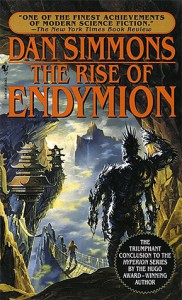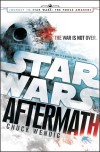The Rise of Endymion
 One thing I forgot to mention in my review of Endymion, the book that precedes The Rise of Endymion, was Simmons' take on the Catholic church, still alive and kicking some one thousand years in the future. In Hyperion and The Fall of Hyperion, Catholicism still exists, but it's an outlying religion, barely holding on so far in the future. The cruciforms, though, those odd devices that resurrect people after death so long as they've accepted one, transform the religion entirely. The church becomes the sole provider of the cruciforms, and treats giving them out as similar to going through the born-again ritual (now quite literally), and the potential for living hundreds of years and hundreds of lifetimes revitalizes the dying church. It revitalizes the church so much that it becomes more than just a church; it becomes a military force that will do most anything to protect itself. Aenea, the central, prophetic character who is the central character for both books, has been perceived as a threat to the church, which is what prompted the chase through the Web worlds in Endymion.
One thing I forgot to mention in my review of Endymion, the book that precedes The Rise of Endymion, was Simmons' take on the Catholic church, still alive and kicking some one thousand years in the future. In Hyperion and The Fall of Hyperion, Catholicism still exists, but it's an outlying religion, barely holding on so far in the future. The cruciforms, though, those odd devices that resurrect people after death so long as they've accepted one, transform the religion entirely. The church becomes the sole provider of the cruciforms, and treats giving them out as similar to going through the born-again ritual (now quite literally), and the potential for living hundreds of years and hundreds of lifetimes revitalizes the dying church. It revitalizes the church so much that it becomes more than just a church; it becomes a military force that will do most anything to protect itself. Aenea, the central, prophetic character who is the central character for both books, has been perceived as a threat to the church, which is what prompted the chase through the Web worlds in Endymion.This half of the Cantos reads as if it is a critique of that religion, and of religion overall. This doesn't bother me, and unlike how Philip Pullman leveled his anti-church agenda against the public with the His Dark Materials series, Simmons at least tells his story with subtlety. That's not to say that the agenda isn't clear -- it is, with the church and its antiquated dogma serving as the antagonists, and Aenea and her own Humanist teachings serving as the protagonists -- but Simmons' stories have a less confrontational tone, and seem to be more about teaching than brow-beating.
The most impressive thing about this volume in the Cantos is how Simmons took all the details that he created for the first two books and brought them to a conclusion here. I'm really just speaking to the construct here; the story itself was lacking in a lot of ways, partly because it didn't have the kind of significance that the first half had, and partly because there was too much coincidence and luck that went into the plot. I'm not sure if Simmons intended for those coincidences to reflect on the prophecy that surrounded Aenea or nowt, but it made for lazy storytelling.
With The Rise of Endymion, I've realized that as much as I like reading Dan Simmons, I can't deny that he's a wordy writer. He enjoys world-building, and since the story traverses several worlds, each with its own unique lifeforms and environments, we spend a lot of time reading verbose descriptions of those worlds. When we meet new characters, we're given more than a brush-stroke of their appearance; we also read descriptions of clothes, hair color, eye color, birthmarks, etc. Near the mid-point of the book, there was a lengthy section where Aenea and Raul are part of a large community, and whenever people gathered in a congregation, we were treated to a long list of named people who attended these congregations. In a lot of cases, this wasn't even necessary. All that was important was that Aenea was becoming more The One Who Teaches and less Aenea; we didn't need to be subjected to a roster of names that was unimportant.
I struggled with Raul as the narrator, too, for a couple of reasons. For one, we're introduced to him in Endymion as being jailed in a spacecraft where he has been left to die, and to keep himself busy until his time of death, he writes down his and Aenea's story. While the convention isn't unusual, Simmons' determination to stick with it grew a little tiresome. In the first book, the narrative shifted from Raul's perspective to de Soya's, and during that book, I took that as a convention, and not as the entire story having been told by Raul. In The Rise of Endymion, Simmons confirms that the whole story is told by Raul, and that he's writing from the other perspectives based on what he learned later in the story. Aside from the story losing some of its tension due to it being told from the future (we never have to worry if Raul's going to die, even when things look grim, because we know he survived to tell the story), it felt like a bit of a stretch to me.
Also, Raul is an insipid, immature character. He's been tasked with being Aenea's guardian, but he consistently makes stupid decisions, says stupid things, lets his emotions run away with him, and ultimately serves more as a foil than a guardian. He doesn't seem to trust in Aenea, despite telling us over and over that he does, and that he would be willing to die for her. In parts of the story, he just got on my nerves more than anything else, and don't forget that he serves as the narrator. Near the end, Simmons brings in an explanation for Raul's thick-headedness, but it didn't sit well with me. Again, it just felt kind of lazy.
Folks who liked the first two books in the Hyperion Cantos might be tempted to read the second half of the series. All I can say is, don't. It's not worth the time, really. Simmons is still a fine writer, but this conclusions doesn't close out anything that was left open at the end of that series, nor does it have the same feeling of importance as the first two books do. It feels to me like it's just a way to cash in on the fans, and it just feels a little cheap. Plus, I know Simmons can write better stories than this one.
One other thing: By finishing this book, I've finished the Unfinished Series project I began eleven months and seventy-seven books ago. As much as I've (mostly) enjoyed finishing up these series, I'm looking forward to reading something new. Kurt Vonnegut's Timequake is a novel about the world moving backward in time, then restarting again in the past, with everyone having an awareness of their future as they relived it, without being able to change anything that would happen. Once people reach the point where their memories end and their lives begin again, they don't really know what to do next. I feel a little like that, having finished off my Unfinished Series project. Now that I have all my books available to me to read, where do I start?






